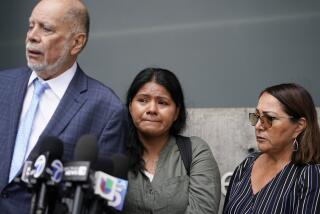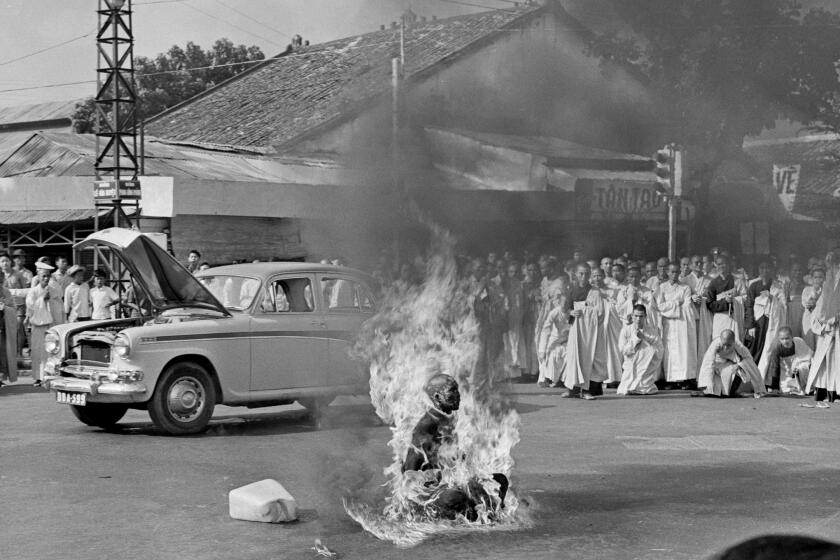Op-Ed: How I fell for OxyContin
In 2000, when I was 19 and having an existential and Adderall-fueled nervous breakdown, I came home from college for a long weekend and sobbed in my mother’s arms. She held me and shushed me, and then — feeling like she was out of options, she’d tell me later — took out a fat, round, green pill from a bottle on her night table and bit off a small chunk. “Here,” she said as she pulled me close, “Maybe this will calm you down.” It did.
I didn’t even ask what it was before I swallowed it, but as soon as it kicked in, I knew: This feels like home.
I’d find out later it was OxyContin.
:::
Five years earlier, my father, like many anesthesiologists, quit working in operating rooms and opened up a small pain management clinic that he, with my mother as office manager, would operate for almost a decade. They offered patients physical therapy, psychotherapy, acupressure and acupuncture, in conjunction with narcotic painkillers. And they weren’t the only ones.
Somewhere along the way we all started to confuse — disastrously — the eradication of pain with the eradication of suffering.
The pain management revolution, which patients-rights crusaders had started in the mid-1980s, reached its climax just as my parents opened their practice, and they were swept up in the medical community’s religious-like fervor to eradicate pain. Under-treating any kind of pain was barbaric, and relieving it was God’s work.
So when Purdue Pharma released a new drug called OxyContin in 1996 — which it touted as only minimally addictive due to its continuous release mechanism — my parents saw it as one more weapon in the war on pain. The company’s sales reps assured doctors that the new wonder drug posed an addiction risk of less than 1%, citing a one-paragraph missive in the New England Journal of Medicine taken wildly out of context (see Sam Quinones’ book “Dreamland”). The company sent my parents to medical conferences where they were shown more flawed evidence and warned against indulging in “opiophobia.”
My parents, like many doctors, had the best of intentions. But good intentions are never the whole story.
:::
An opiate high feels like a shimmering — not just you but your whole life shimmers. You start to tingle, as every muscle, thought and feeling slides into something looser and warmer. It’s not oblivion, not at first anyway. No, in the beginning, it’s just this soft hush whispering down your spine, your whole life transforming itself into a beautiful if sad mirage somewhere over there.
And the true menace is the way it makes you feel like you are better with it — that you’re finally seeing your life clearly for the first time. Like you’ve found an answer to every question you never even knew you were asking.
At the end of my school break in 2000, my mom sent me back to school with a handful of pre-sliced chips of Oxy, borrowed from her prescription for a bad back. I proceeded to fall in love with painkillers the way you fall for a person: gradually and then all at once.
At first, I only took a “dose” every other day or so, mostly at night. As the weeks went on, though, I found myself thinking about Oxy earlier and earlier in the day, until the urge pulsed inside me from the moment I woke up: Is it time yet? A month later, I dropped out of school.
I went home to upstate New York, where my parents took me to a GP who prescribed 240 milligrams of OxyContin a day for fibromyalgia. Later they took me to a fellow pain specialist, a sweet man who seemed both truly concerned about me and absolutely unafraid of prescribing a myriad of opiates.
None of it was illegal — in fact, it was encouraged. Pain had become the fifth vital sign, and freedom from it, a basic human right. My doctor was honor-bound to believe me about how bad my pain was, and to prescribe accordingly: 240 mg of OxyContin, 180 mg of generic morphine sulphate, and boxes of Actiq — fentanyl lollipops that I rubbed on the inside of my cheek for faster absorption. (They tasted just like SweeTarts.)
Nearly a decade would go by before I’d find myself in rehab.
:::
I swear to God, when I was using, I wanted to believe the pain was real, and when I stopped, I wanted to believe the doctors — and my parents — were to blame for what I’d lost. I boiled with rage, refusing to speak to my mother and father for almost two years. When I let them back into my life, I started to ask questions.
Enter the Fray: First takes on the news of the minute »
How could my mother possibly have given me that first pill? Her answer is simple: I was falling apart and she was more afraid of what I’d do to myself than of what the Oxy would do to me. She stands by her reasoning, and everything she and my father didn’t yet understand. My dad, again and again, cites the pharma sales reps’ spiel: “They lied to us.” They both say they’d have done things differently if they’d only known.
It’d be a much simpler world if terrible consequences were only the result of terrible intentions. But that sweet pain doc thought he was helping me, just as my dad thought he was helping his patients. And my mom’s decision to hand me a pill was actually an attempt at parenting.
Somewhere along the way we all started to confuse — disastrously — the eradication of pain with the eradication of suffering. Freedom from suffering should, indeed, be a basic human right. No one should have to endure unbearable cancerous or post-operative pain, and the patients-rights movement was an undeniable marker of progress. Somehow that turned into let there never be a moment of discomfort. The problem there, of course, is that any mild irritant can become unbearable. We build no tolerance to life.
My parents’ clinic, mired in financial problems, closed before the words “opioid epidemic” became common parlance. I survived, unlike so many others. And now I read that the former president of Purdue Pharma is a patent holder of a new form of buprenorphine, a synthetic opiate used to combat opioid abuse. Fear not, they say, this opiate is the good kind and will help lots of suffering people.
Where have we heard that before?
Dani Fleischer is at work on a memoir.
Follow the Opinion section on Twitter @latimesopinionand Facebook
More to Read
A cure for the common opinion
Get thought-provoking perspectives with our weekly newsletter.
You may occasionally receive promotional content from the Los Angeles Times.






